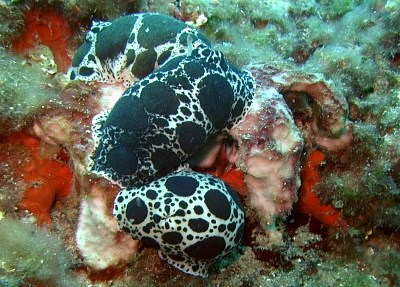Discodoris atromaculata from Greece
April 29, 2001
From: Peter H. van Bragt

Dear Bill,
The attached picture was taken in Greek Mediterranean waters near Chalkidiki in March 2000 by Claudia Gravenstein from Belgium. She asked me to verify the species name but also gave me permission to post the slides on the Forum.
Obviously they are Peltodoris atromaculata or also called Discodoris atromaculata, which ever name came first. As this species seems to be rather variable in appearance I thought it might be nice to add these specimen also to the collection of the Sea Slug Forum.
With best regards
Peter H. van Bragt
vanbragt.phjm@hsbrabant.nl
van Bragt , P.H., 2001 (Apr 29) Discodoris atromaculata from Greece. [Message in] Sea Slug Forum. Australian Museum, Sydney. Available from http://www.seaslugforum.net/find/4243Thanks Peter,
Yes this photo is a nice addition to the Forum as it shows a darker colour form than usually photographed and also quite a bit of variability in colour at one location.
Firstly about the name. In this case it is not a case of 'which came first' but which genus it should belong to (Discodoris or Peltodoris?) . The 'law of priority' - which name comes first - only applies to the species word, in this case atromaculata. In this case there is an added problem because we are not sure whether there are sufficient anatomical differences between the genera Discodoris and Peltodoris to consider then to be two distinct genera in the first place. I am calling it Discodoris, because that seems to be the present usage among Mediterranean workers.
Now to the colour differences. It has been suggested that there is a gradual change (or cline) in colour pattern in this species from west to east, with the colour gradually darkening towards the east. Most photos I have seen are from the western end of the Mediterranean and they certainly have a higher proportion of white than these animals from Greece. However the animal in the front of the photo seems to have much more white than the other two in the photo, more like those from the western Mediterranean. Clearly three isn't a very good sample of the Greek population and even if the population was on the whole darker, you would expect to find a few lighter coloured animals as well.
I have added some more information to the D. atromaculata Page and have added a page listing some relevant References to aspects of its biology and natural history.
Please pass on my thanks to Claudia,
Best wishes,
Bill Rudman
Related messages
-
Peltodoris atromaculata abnormality
From: Antoni López-Arenas i Cama, September 9, 2009 -
Re: Peltodoris atromaculata with damaged mantle
From: M. Baki Yokes, June 12, 2009 -
Re: Peltodoris atromaculata with damaged mantle
From: Dominique Horst, May 27, 2009 -
Peltodoris atromaculata from North Cyprus
From: Carol Cox, April 8, 2008 -
Peltodoris atromaculata from southern Portugal?
From: Pedro Alexandrino Monteiro, August 11, 2007 -
Discodoris atromaculata feeding
From: Anne Kloeppel, June 7, 2007 -
Discodoris atromaculata from Croatia
From: Gearoid Lane, March 30, 2006 -
Discodoris atromaculata on Petrosia ficiformis
From: Stephane Ores, January 13, 2006 -
Re: Discodoris atromaculata from Greece
From: Andrej Jaklin, February 25, 2004 -
Re: Discodoris atromaculata from Greece
From: Baki Yokes, February 24, 2004 -
Discodoris atromaculata from Greece
From: Mihalis Polyadis, February 23, 2004 -
Discodoris atromaculata from Adriatic
From: Adam Petrusek, October 8, 2003 -
Discodoris atromaculata from Holland
From: Andy den Boer, July 1, 2003 -
Discodoris atromaculata egg-ribbon
From: Marina Poddubetskaia, July 28, 2002 -
Discodoris atromaculata from France
From: Marina Poddubetskaia, June 28, 2002 -
Discodoris atromaculata from Greece
From: Fons Sarneel, March 19, 2002 -
Re: Food of Discodoris atromaculata
From: Juan Vicente López-Canales, February 15, 1999 -
Re: Photo of Discodoris atromaculata
From: Erwin Koehler, February 1, 1999 -
Food of Discodoris atromaculata
From: Juan Vicente López-Canales, January 28, 1999
